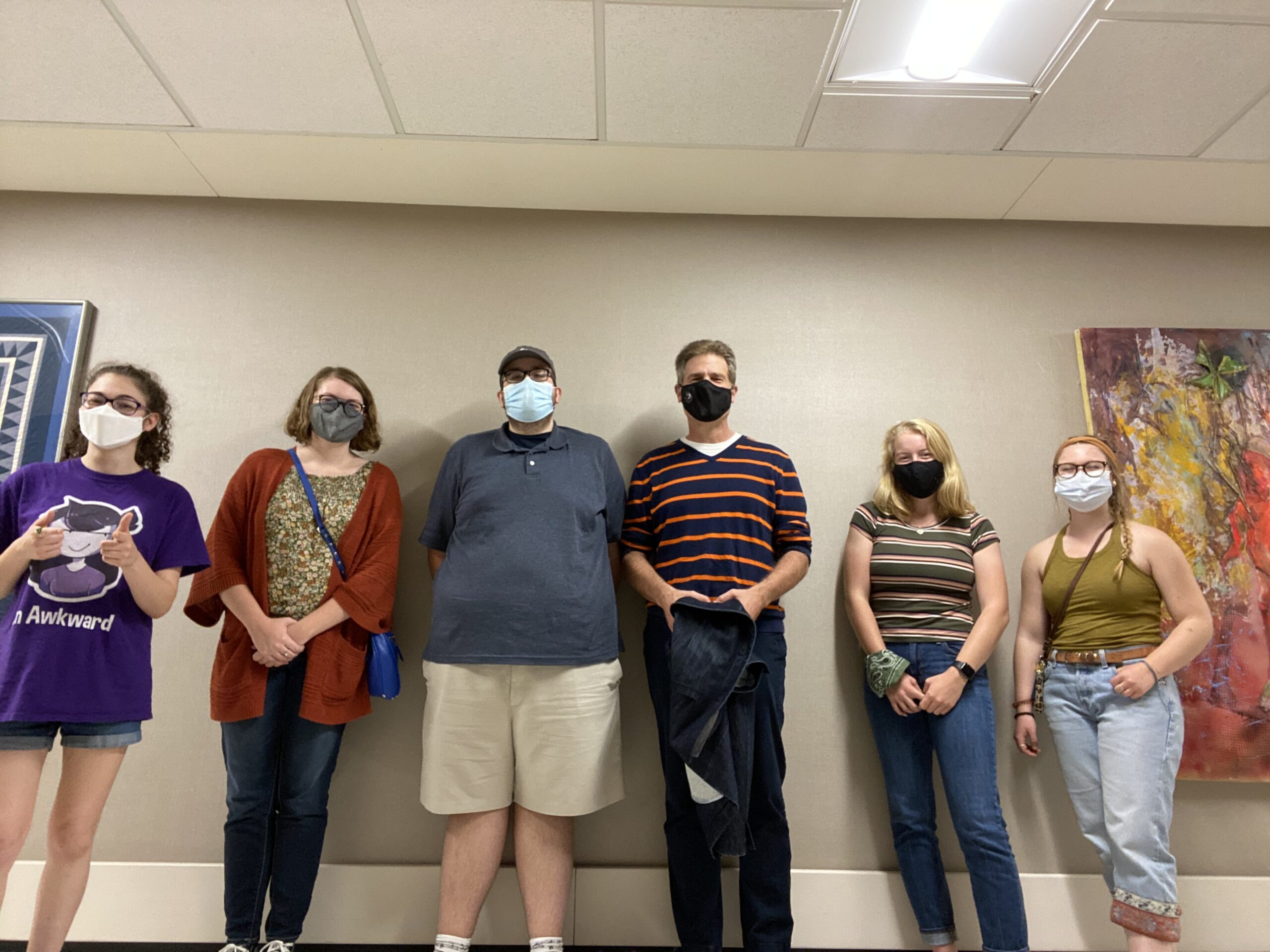Good Thunder Reading: The First of Many by Sabrina Seiwert

Thursday, September 16th, was truly a night to remember for Sigma Tau Delta. This national honor society is dedicated to students who are passionate about the English language, literature, and writing. We were itching to move beyond our four walls and find our first linguistical nerdy outing together since the pandemic hit. And so, we decided that the Good Thunder Reading Series met our requirements to appreciate modern literature while spending time together. The members of this national honor society, including myself, drove to Minnesota State University in a chain of cars, abandoning each other at yellow lights. We marveled at MSU’s glass-like whiteboards, and contemplated barbaric yawps in a dimly lit parking lot.
The evening started with a bit of a mishap, as Lars Johnson, STD’s advisor, failed to specify what Honsey Hall parking lot the society should meet in. Thankfully, with a little deductive reasoning, I arrived at the appropriate parking lot only five minutes late. After checking if we all had masks, we piled into our respective cars and trundled off to Minnesota State University. (Though it may seem off-topic, I find it necessary to add that there may have been some reckless abandonment at yellow lights on the drive.)
MNSU’s Centennial Student Union hosted the Good Thunder Reading Series, whose aim is to educate others on the cruciality of literature and why writing as a whole is so important. Like STD, they also appreciate literature of all kinds, such as nonfiction, creative short stories, poetry, and more! The Good Thunder Reading Series has also taken the liberty of inviting local authors several times a year to give readings, promote their writings, offer workshops and craft talks, and answer any questions the general public might have about their work. Best of all, it’s free and open to everyone! Good Thunder offers those visiting a chance to interact with aspiring contemporary writers.
“Her pleasant voice and skilled imagery sucked me into her memories, experiences, and her past life.”
As I was sitting in a plush seat in MNSU’s Student Union, Joquira Diaz, author of Ordinary Girls, emerged from the front row and greeted the audience. Her pleasant voice and skilled imagery sucked me into her memories, experiences, and her past life. Diaz immediately launched into the story of her childhood in Puerto Rico and discussed her mentally unstable mother and her poverty-stricken home life full of drugs and violence. She proudly showcased herself as a strong writer in the way she bared her heart and vulnerabilities of racial confusion and sexual identification. Her use of imagery was extremely detailed, as I was able to clearly picture what was happening in her memoir. When the chapter ended, I was abruptly jolted from my movie-like reverie, blinking stupidly and wondering what had just happened. From listening to Diaz read Chapter 7 from Ordinary Girls, I determined that her memoir was raw and vivid. It was skillfully crafted so that it reads like a fictitious narrative. There were instances in this reading that left me uncomfortable, as her use of graphic detail was unsettling to some listeners.
We, the members of STD, left MNSU discussing Diaz’s motives behind her storytelling. We noted that her use of graphic detail was so outlandish at times that we questioned whether she used the “shock factor” in order to keep readers continuously engaged with her writing. I noticed the same literary tactic used by Haruki Murakami, author of Kafka on the Shore. His book was laced with graphic smut in numerous scenes that didn’t contribute much to the overall plot. One can only assume it was used as a literary tactic designed to keep readers engaged. I, however, was triggered and distracted, forgetting the overall plot of the story in the wake of my disgust. I can’t say that Diaz’s book elicited the same reaction as Kafka, but from listening to one chapter, it seemed to be moving in that direction. In addition to Diaz’s excerpt reading, we lightened our reflective conversation with discussions of Frankenstein, Whitman and his barbaric yawps, and Horton Hears a Who.
Overall, despite Diaz’s disturbing aspects of her reading, the Good Thunder Reading was an enjoyable night. We ventured away from campus to nerd out over contemporary literature. Diaz’s thought-provoking chapter reading was a definite conversation igniter. I for one left the room stunned, and I can only imagine some in the group felt the same way, though we didn’t discuss it in detail. Regardless, it was a great night of camaraderie, picture taking, and laughter. I’m excited about Sigma Tau Delta’s next adventure!
If you want to check out the Good Thunder Reading Series for more info, click here.
